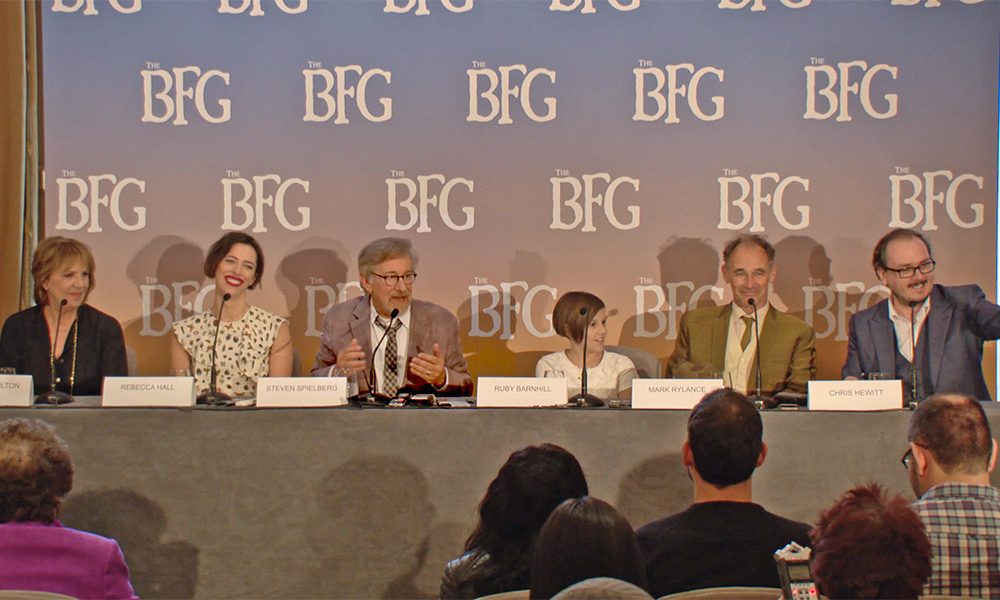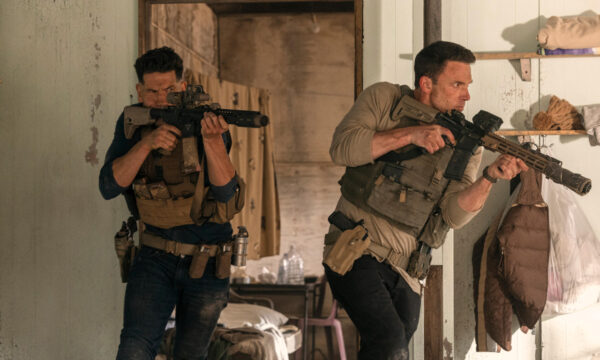The BFG: Press conference with Steven Spielberg, Mark Rylance, Penelope Wilton, Rebecca Hall and Ruby Barnhill

Not satisfied with having ET, Tintin and Jaws to his name, Steven Spielberg, whose name is as synonymous with cinema as Rylance with theatre and Dahl with children’s literature, tackles one of the best loved children’s classics of all time, as director and producer of The BFG. It’s summer holiday season and, in the heart of London, The Upcoming caught up with the stars of the movie, which looks set to become the children’s hit of the summer.
When did the book enter into your lives?
Mark Rylance: it entered my life when Steven asked me to read the script in the first few days of filming Bridge of Spies; I didn’t know at that stage that he intended to cast me in it.
Ruby Barnhill: I hadn’t read it before I began filming. All of my friends had read it and they suggested I read it. Even when I went to the audition I hadn’t read it – I remember my dad asking me before “You’ve definitely read the book, haven’t you?” but now I have!
Steven Spielberg: I read it to my kids. It wasn’t the first Dahl I had read – obviously Charlie and the Chocolate Factory was better known to me. I think why it stuck with me was because it enabled me to popularise myself with my kids. Speaking it aloud meant I came into contact with the book as something oral, something that ought to be performed.
Rebecca Hall: I read it as a kid, it was something personal and private, intrinsically linked with my childhood.
Penelope Wilton: My daughter read it first, I only actually read it because this year is the centenary of Roald Dahl’s life. I have been going around schools and reading it to children as well.
Steven, what do you enjoy the most about watching films?
SS: For me it’s all about suspending disbelief: forgetting everything I know about filming and techniques. I let the film wash over me, I don’t fall back to figure out how the film was made.
Ruby, what was it like working with Steven and such an amazing cast? And what advice would you give?
RB: Well, it was incredible to work with such a talented director and cast. The most viable advice I would give would be concentration, and not just because I am easily distracted. More to make sure you get in character before you start speaking.
Steven, Mark seems to be your new muse, what made him right for the part?
SS: It all rests in an intuitive tickle; I got it with Ruby. The intuitive tickle was what meant I chose her out of hundreds of other girls. Somehow the whole world stops and you know that actor is the one. You can’t deconstruct it. I knew of Mark late in the 80s when I was filming Empire of the Sun. Not only is he an incredible theatre actor, he’s a liquid actor – he can fill any shape of vessel. The moment of intuition with him was the first day of shooting Bridge of Spies.
Mark, what did you feel you could bring to the role?
MR: I hoped I could bring my joy of acting. Ruby showed me how just being there, everyday, was an important part of that, just turning up 90% of the time was most of the job done in a sense. It was all about joy, bringing it, making it on set. Steven was so well prepared, a lot happens in the room and he risks things. He’s not frightened to make mistakes and that makes me braver.
And to the rest of the cast, what did you love the most about working with Steven?
PW: I would agree with Mark – Steven trusts you in the part. You know he has chosen you and no one else. He wants you. He makes you feel open to do your best work. Anyone who places strictures on actors makes the actors’ work small.
SS: I am not an actor. I don’t direct, thinking “I could do better in that role.” I am as much in the actors’ hands as they are in mine, and I think that’s why I choose to let them do what they want.
RH: I have to say what I loved the most about working with Steven would have to be the conversations we had. There is really no one better to have a geeky film chat with, but also so many of his films played a big part in my childhood. It felt like a return to my childhood.
The BFG is massive, but if you had the choice would you rather be really tall or really small?
RB: I think I would probably be small because then you could see more things. If you’re really big you can’t see things in as much detail because you are higher up.
MR: Well I’m not that tall myself, so I would enjoy being tall. I mean really tall though. Most of the tall people I know are very gentle and funny – think of John Cleese.
SS: Well my choice would be to be small. If you’re small you can sometimes not be noticed and get away with things.
Steven, you’ve had an incredible career. Are you proud of your legacy, and what you think the key to your success has been?
SS: Well I’m just proud that I’ve been able to stay interested. I think that’s what its all about. I’ve met a lot of my heroes as I came up the ranks of being a film director. And I’ve seen the one thing that happens when directors get older is they still have the passion and they still have the determination to tell stories, but because of their age, the people who do the hiring look at you as a relic from a past age. And one of the reasons I started Dreamworks back in 1994 was because I refused to be seen as a relic of the past age; if I can hire myself and form a studio to keep myself working, by God that’s exactly what I’m going to do. I feel like I should get tired, but I don’t. I love what I do. I don’t look at myself with the world legacy, I think I am so busy at looking ahead, I don’t look back often. I am really proud of the way people have grown up with my films.
So you’re not going to tell us what your favourite film is?
SS: No, no that’s the toughest question to answer! The true, clichéd answer (and that is the true answer, because clichés are formed in truths), is that I don’t [have one]. I have seven children, it would be like asking me which one of them I prefer.
Penelope touched on the Roald Dahl centenary, do you worry about the future of books? Do you think in years to come we will still be celebrating books with films?
PW: I think we will. Nothing can compete with the child’s imagination. You have that and then other people’s vision. I think reading a book is something you do yourself, books have a life and I think they will continue to survive.
Roald Dahl is often viewed as the genius of literature and you [Spielberg] of film – what is the essence of being a director?
SS: If I knew the answer to that a lot of people would get jobs tomorrow. I view myself as a conservative director: I am indebted to the directors of the past. I do a lot of looking back in an attempt to understand what makes a good story. You need to look at the old films and the not-so-old films to create something new. I started off with the silent movies, with the subtitles, where the visual arts where more explosive and led you to an emotional reaction. And then to the talkies where you have the emergence of Shakespearean style dramatics. I used to bribe my kids, pay them $10 to watch a black-and-white film, and mostly they would last till half way through the film and then give me my money back
You have been making films for more than 40 years. What is the greatest change you have noticed in the filmmaking process?
SS: I think it is down to special effects. Before advanced special effects, it was all about tricking the audience into believing an illusion. The digital revolution destroyed the illusions. No longer does the filmmaker need to use practical magic, it has become photo-real. If The BFG has succeeded as a movie. then what it should do is make you forget that special effects are being used. Forget that Mark is a giant next to a four-foot Ruby.
Georgie Cowan-Turner
The BFG is released nationwide on 22nd July 2016.
Read our review of The BFG here.

























Facebook
Twitter
Instagram
YouTube
RSS